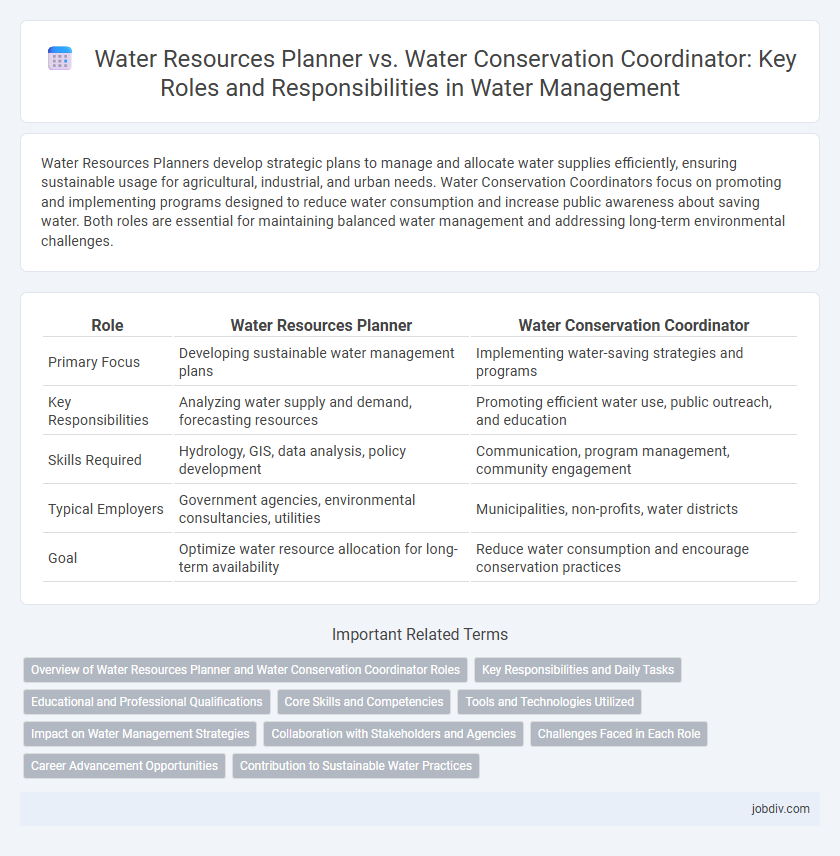Water Resources Planners develop strategic plans to manage and allocate water supplies efficiently, ensuring sustainable usage for agricultural, industrial, and urban needs. Water Conservation Coordinators focus on promoting and implementing programs designed to reduce water consumption and increase public awareness about saving water. Both roles are essential for maintaining balanced water management and addressing long-term environmental challenges.
Table of Comparison
| Role | Water Resources Planner | Water Conservation Coordinator |
|---|---|---|
| Primary Focus | Developing sustainable water management plans | Implementing water-saving strategies and programs |
| Key Responsibilities | Analyzing water supply and demand, forecasting resources | Promoting efficient water use, public outreach, and education |
| Skills Required | Hydrology, GIS, data analysis, policy development | Communication, program management, community engagement |
| Typical Employers | Government agencies, environmental consultancies, utilities | Municipalities, non-profits, water districts |
| Goal | Optimize water resource allocation for long-term availability | Reduce water consumption and encourage conservation practices |
Overview of Water Resources Planner and Water Conservation Coordinator Roles
Water Resources Planners develop strategies for sustainable management, allocation, and protection of water supplies, analyzing hydrological data and environmental impact assessments. Water Conservation Coordinators focus on implementing practices and programs to reduce water consumption and promote efficient use within communities or facilities. Both roles aim to balance water demand with ecosystem preservation but differ in scope, with planners addressing large-scale resource management and coordinators targeting behavior change and policy enforcement.
Key Responsibilities and Daily Tasks
A Water Resources Planner focuses on analyzing water supply and demand data, developing sustainable water management strategies, and coordinating infrastructure projects to optimize water distribution. A Water Conservation Coordinator designs and implements programs that promote efficient water use, educates the public on conservation practices, and monitors the impact of water-saving initiatives. Both roles require collaboration with government agencies and stakeholders to ensure sustainable water resource management.
Educational and Professional Qualifications
Water Resources Planners typically require a bachelor's or master's degree in environmental science, civil engineering, or water resource management, along with experience in hydrology, GIS, and policy analysis. Water Conservation Coordinators often hold degrees in environmental studies, natural resource management, or public administration, with expertise in community outreach, behavioral change strategies, and water-saving technologies. Professional certifications such as Certified Water Resource Professional (CWRP) or Certified Water Efficiency Professional (CWEP) enhance qualifications for both roles.
Core Skills and Competencies
Water Resources Planners excel in hydrological analysis, watershed management, and project planning to optimize water allocation and sustainability. Water Conservation Coordinators specialize in community outreach, behavior change strategies, and regulatory compliance to reduce water usage and promote efficiency. Both roles demand strong data analysis skills, effective communication, and knowledge of environmental policies to address water resource challenges.
Tools and Technologies Utilized
Water Resources Planners utilize advanced hydrological modeling software, Geographic Information Systems (GIS), and remote sensing technologies to analyze water availability, forecast demand, and develop sustainable management plans. Water Conservation Coordinators rely on usage tracking tools, leak detection devices, and public engagement platforms to implement conservation programs and monitor water-saving initiatives. Both roles integrate data analytics and smart water management systems to optimize resource efficiency and promote sustainability.
Impact on Water Management Strategies
Water Resources Planners analyze hydrological data and develop long-term plans to optimize water allocation across urban, agricultural, and industrial sectors, significantly influencing regional water sustainability. Water Conservation Coordinators implement targeted programs to reduce water consumption, promote efficient usage practices, and engage communities, directly impacting daily water demand reduction. Collaborative integration of strategic planning and conservation initiatives enhances overall water management effectiveness and resilience in response to environmental challenges.
Collaboration with Stakeholders and Agencies
Water Resources Planners develop integrated management strategies by collaborating closely with government agencies, environmental groups, and community stakeholders to ensure sustainable water allocation. Water Conservation Coordinators work hand-in-hand with local utilities, public outreach teams, and regulatory bodies to implement conservation programs that reduce water usage and promote resource efficiency. Both roles rely on effective stakeholder engagement and interagency communication to achieve water sustainability goals.
Challenges Faced in Each Role
Water Resources Planners face challenges such as balancing competing demands for limited water supplies, integrating climate change projections into resource management, and navigating complex regulatory frameworks. Water Conservation Coordinators encounter obstacles including promoting behavior change among diverse populations, securing funding for conservation programs, and measuring the effectiveness of water-saving initiatives. Both roles require adapting to evolving environmental conditions and stakeholder priorities while ensuring sustainable water use.
Career Advancement Opportunities
Water Resources Planners often progress into senior environmental consultancy or government policy advisor roles due to their expertise in hydrological data analysis and resource management strategies. Water Conservation Coordinators typically advance by leading sustainability programs or managing community outreach initiatives, leveraging their skills in behavioral change and resource usage reduction. Both careers offer pathways into specialized sectors, such as climate resilience planning or urban water systems management, driven by growing demand for integrated water solutions.
Contribution to Sustainable Water Practices
Water Resources Planners develop comprehensive strategies for managing water supply, quality, and distribution to ensure long-term sustainability and resilience against drought and climate change. Water Conservation Coordinators implement targeted programs promoting efficient water use, reducing waste, and engaging communities in conservation efforts to minimize environmental impact. Both roles critically contribute to sustainable water practices by balancing resource availability with ecological preservation and public demand.
Water Resources Planner vs Water Conservation Coordinator Infographic

 jobdiv.com
jobdiv.com